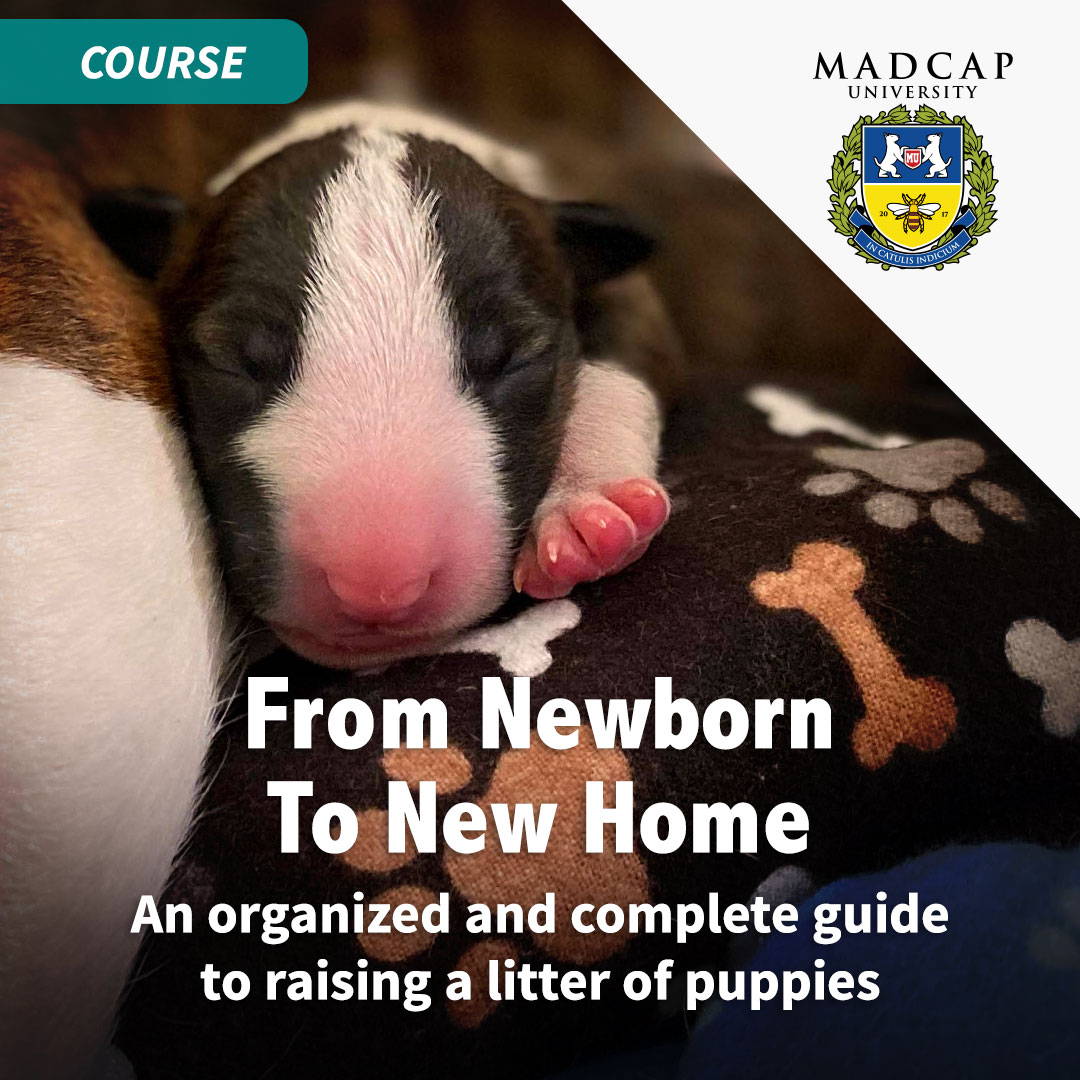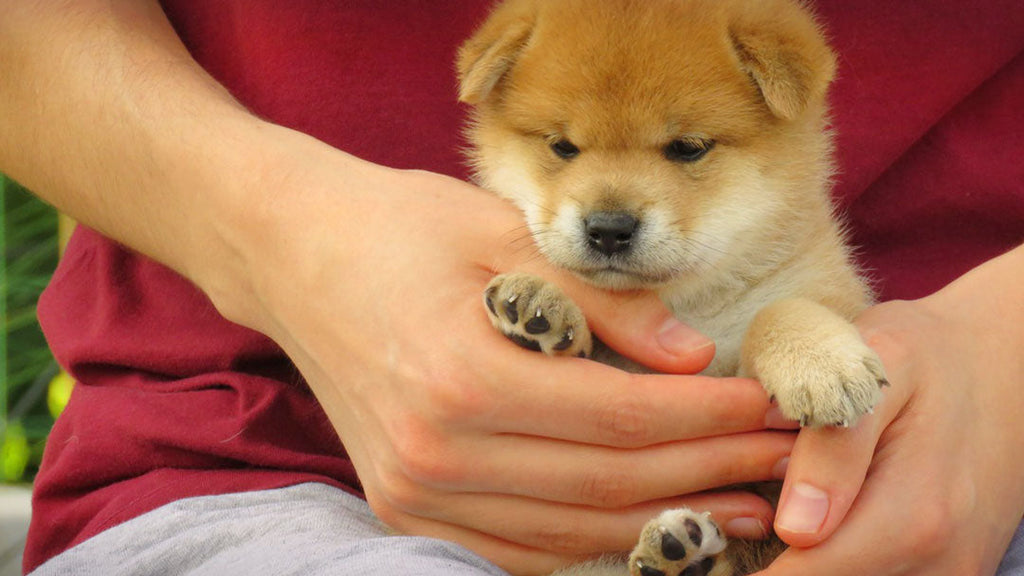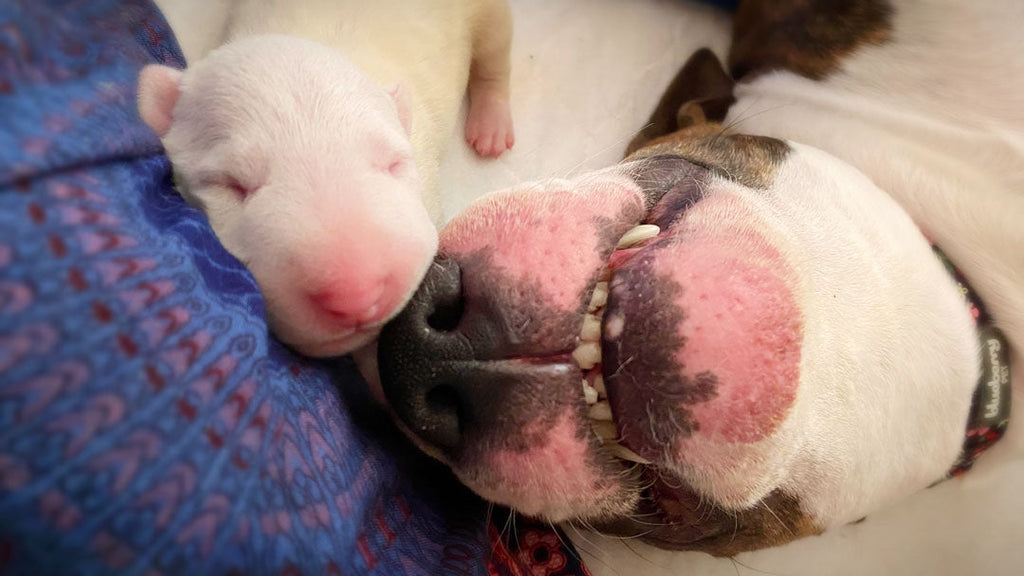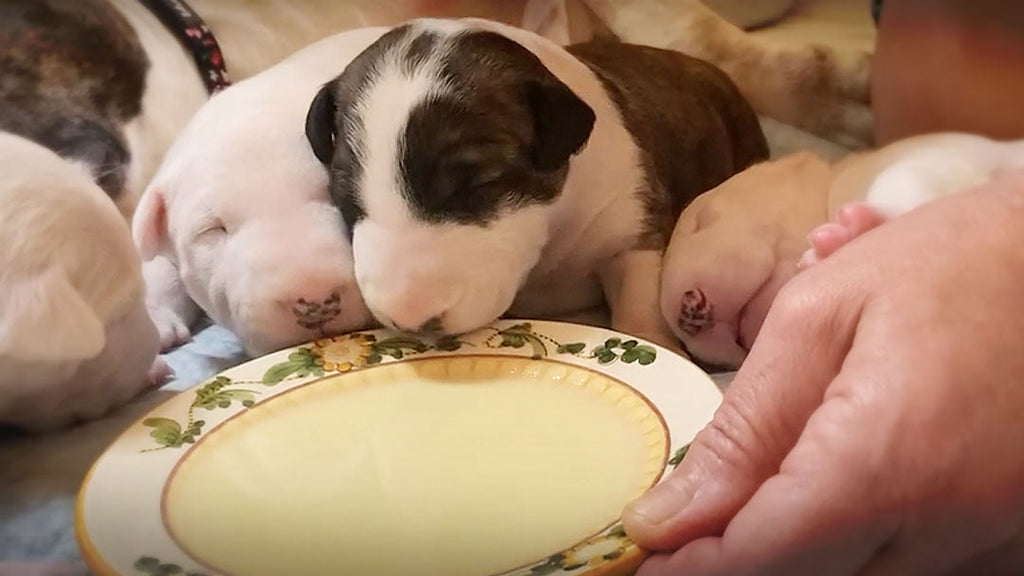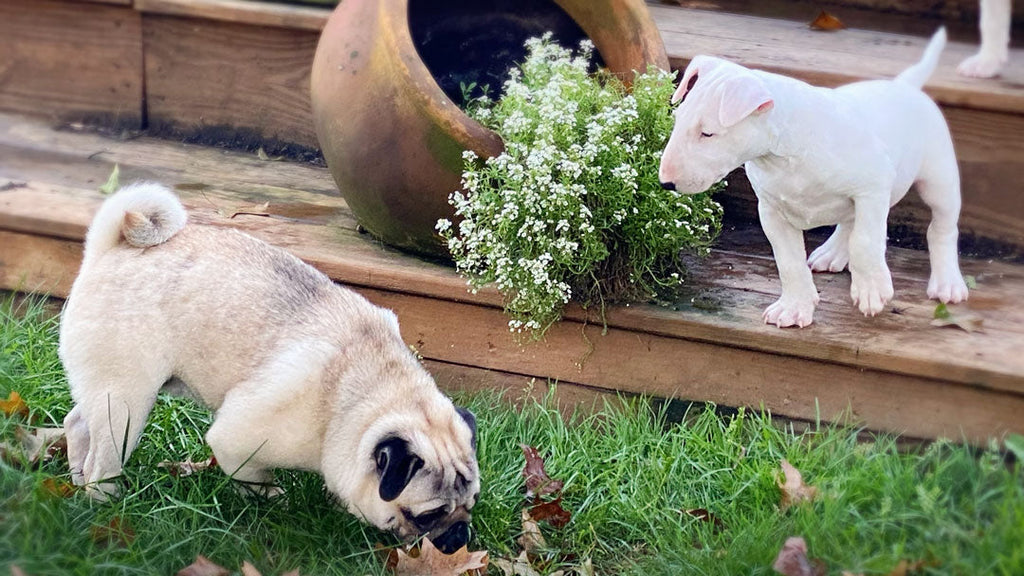Extreme Reactions In Young Puppies: A New Look at the Transitional Period - Part One

There is a terrifying (for the breeder) phenomenon that, to my knowledge, is unreported in the scientific literature yet not uncommon in transitional-aged puppies.
And that is, “extreme” reactions to handling and/or spontaneous screaming in that 2–4-week-old age range. It’s something that breeders regularly write in about and are very alarmed by, so I want to explain what it is, why we think it happens, what you can do about it, and the likely outcome for these “screamers.”
“Screaming Puppy” Syndrome
As you know if you follow us on the Puppy Culture Discussion Group, it is not at all unusual for puppies to have extreme reactions to handling, especially around their head and neck, anywhere from two to three weeks old. reactions can vary from squirming to outright screaming.
In some cases, the extreme behavior is spontaneous - puppies will just start screaming out of nowhere around this age, even if they are not being handled. It looks a lot like an extreme fear response but is happening well before the typical age range for onset of fear.
It’s so common that we did a survey of breeders and put together a chart with the results. Please note, this is not a scientific document and not peer reviewed... it's just information we've collected over the years. Take it for what it's worth, but it's worth mentioning that Poodles and Poodle crosses are overrepresented in the breeds that report this phenomenon, so it’s probably something Poodle breeders should be prepared for.
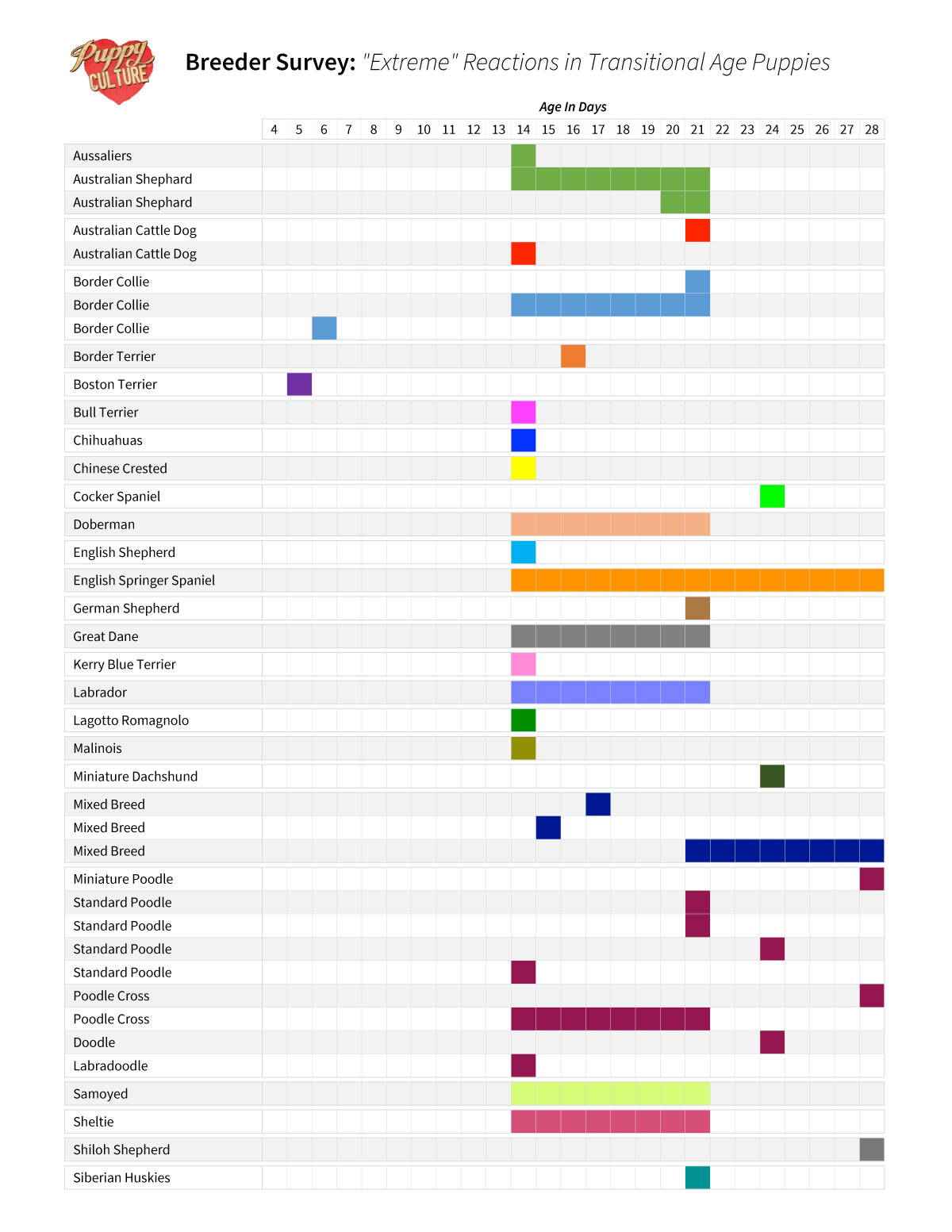
What causes it
We don’t know some puppies display these kinds of “extreme” behaviors, but it does seem clustered around the time the ears open. Our hypothesis has always been that the maturing neurological system may cause the puppy to have some extreme reflexive responses. Also, the ears are opening and that can be quite disconcerting. Imagine you are deaf and suddenly can hear – that would be quite startling!
We witnessed it firsthand with one of our litters recently and, in that instance, I felt like this was actual pain and probably something like you feel when your ears pop. Usually it’s not too painful but sometimes it’s terribly painful and if you’ve ever felt ear pain you know it’s the worst. So, for a tiny puppy the imbalance of pressure in the ear canals could be quite painful. And I don’t know the mechanics of how the ears open but, judging from the reaction I saw, I imagine they don’t always open all at once in a clean fashion, so the intermittent screaming may be the ears opening and then closing and opening again… this article does a decent job of explaining why this is a painful process.
I also don’t think the extreme reactions that members have reported in the Puppy Culture Discussion Group are all caused by exactly the same thing – some may be confusing neurological signals and some may be actual pain. So, keep that in mind when you are reading the rest of this post…your puppy may or may not have the same problem that ours did. So your best course of action may not be the same as what we suggest here.
What You Can Do for "Screamers"
That having been said, what follows is an account of what happened in our case and what we found to be helpful. Before I even begin, I will say that a continually crying puppy that cannot be comforted is a candidate for veterinary attention. This is for acute (sudden) extreme reactions that appear to pass quickly and happen around the 2-3 week old age range - VERY IMPORTANT please remember that developmental periods can vary by days or weeks:
It started on Sunday night when the puppies were 14 days old. That was also the first time we noted the puppies’ first startle response, so presumably their ears opened for the first time that day. Toward the evening, Violet suddenly screamed bloody murder. Really, blood curdling scream that sent the whole house, dogs and people, running. I was sitting and watching them at the time, and I saw that her littermates were sort of walking over her and they had just eaten so I thought, well, maybe she has a little gas and someone jabbed her in the belly. She seemed to recover right away so I did not think too much of it.
But the screaming continued intermittently, waking us up several times that night and escalating through Monday. Each time, we would pick her up and hold her close to us and stroke her and she would settle, but we noticed that she seemed to be almost gasping or yawning during each incident, which looked to me like she had some kind of pain or discomfort in the ear/jaw area.
One of our friends who is a super experienced Bull Terrier breeder felt it might be a pinched nerve in her neck and they suggested gentle traction. Based on the reports in this group, I would lean more towards some kind of ear pain BUT, either way, the traction was a brilliant suggestion. Proponents of chiropractic care are big on adjustments for ear pain and certainly if the top vertebrae are bunched up in any way, that could put pressure on the eustachian tubes. Even if there were no pinched nerve, gently opening up the area with traction could help relieve pressure.
Attached is a video of our puppy traction session. This particular puppy just loved it and immediately sank into my hands when I started. Her peak, intermittent, screaming happened in a 12 hour period, with intermittent yelps for about 12 hours on either side of that – so about 36 hours total, with a few hours of dramatic, intermittent screams. And then it was gone just like that. Interestingly, she now does not settle so easily nor enjoy traction so much, so I have to think that at that time that we did it (which was during her peak screaming period) it really gave her relief.
Important Notes on Traction Technique
A few notes on the video. I am allowing her to lean into my hand just enough to about raise her elbows off the ground, but not lifting her all the way up. Also, you will notice that she pulls back and I immediately let up, but she settles back in so I continue. This has to be something the puppy WANTS to do. Please do not hang or force your puppies into traction. If they are not enjoying it, they do not need it – they probably have a different problem, or it hurts them so don’t do it if they don’t enjoy it.
You will see her doing a lot of lip smacking and jaw clicking as she is in traction which, again, makes me think it’s giving her relief from some kind of pressure in that area.
We did about two minutes at a time for three or four sessions over the period of 24 hours and she seemed good as gold after that. Probably it would have passed, anyway, but I do think the traction helped make it less miserable for her.
I included a second video with a close up of my hand position. If your puppy does not enjoy traction, you might consider gently massaging the space just below the ears and all around the set on of the head. We did that as well with Violet and she liked that, too.

Other Considerations
Absolutely discontinue ENS if your puppy is screaming. Whether it's screaming when handled or screaming spontaneously, your puppy does NOT need ENS, your puppy needs to sort out his discomfort, and you need to help him do that. ENS is meant to provide mild discomfort so that is the last thing in the world you want to do now.
Is There Something Wrong with Screaming Puppies? What's the Prognosis?
100% of the cases that we have heard of where the puppy displayed these extreme reactions, either to handling or spontaneously, between the ages for 2-3 ish weeks old have had positive outcomes. The syndrome passes quickly and completely with no lasting effects. There does not appear to be any correlation with any adult personality dimension. So, as scary as it is when it happens, take a deep breath and don’t panic.
Again, the “screaming puppy syndrome” is a very particular thing at a very particular time. We always recommend veterinary attention (and not Dr. Google or Dr. Facebook) for any puppy that appears sick or in ongoing distress. The hallmark of the screaming puppy syndrome is that it comes on suddenly and passes quickly – a puppy that is continually crying or “punky” needs to see an actual vet.
For Further Study
This article is based on material we present in our breeder course, From Newborn to New Home. Join us in the course for further discussion and instructions on this and every other topic related to raising a litter, from colostrum to clicker training!

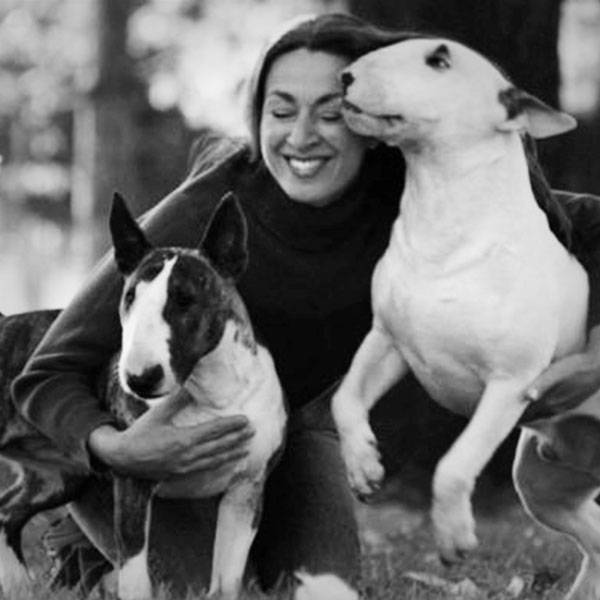
About the Author
Jane Messineo Lindquist (Killion) is the director of "Puppy Culture the Powerful First Twelve Weeks That Can Shape Your Puppies' Future" as well as the author of "When Pigs Fly: Training Success With Impossible Dogs" and founder of Madcap University.
Jane has had Bull Terriers since 1982 and she and her husband, Mark Lindquist, breed Bull Terriers under the Madcap kennel name.
Her interests include dog shows, dog agility, gardening, and any cocktail that involves an infused simple syrup.


